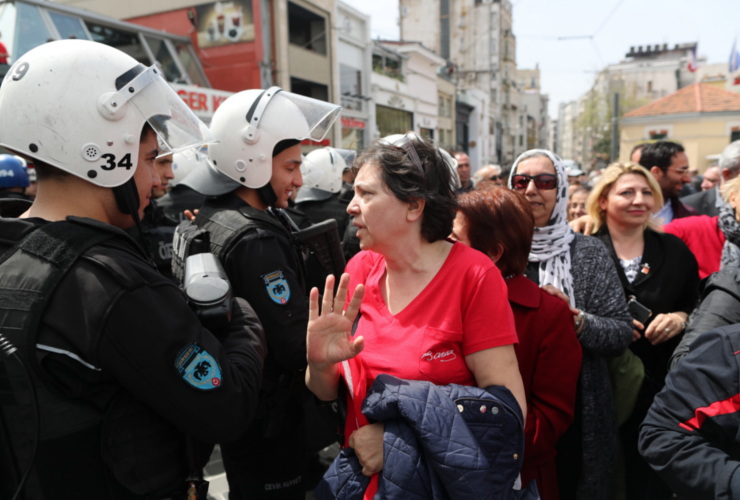The decrees have severely damaged press freedom in Turkey, ordering the closure of nearly 200 media organizations – including newspapers, magazines, radio stations, television broadcasters and news agencies – and transferring their assets to the Turkish state treasury. According to a recent report on the state of emergency by the Human Rights Joint Platform, the liquidation of media assets alone generated a revenue of almost 5 million euros (27.17 million Turkish lira) for the treasury between July 2017 and February 2018.
In addition to media organizations, the decrees have shuttered hundreds of NGOs and cultural institutions. They have forced out locally elected mayors in favour of government appointees and removed hundreds of thousands of civil servants, police, lawyers and academics from their posts.
Though recognized as a legitimate means to restore law and order following a direct and immediate threat to national security, non-governmental decrees should “lose their legal effect with the expiry of the state of emergency”, according to the Venice Commission, a group of constitutional law experts that advises the Council of Europe.
“Permanent changes to legislation should not be introduced through such decree laws, but must be left to ordinary legislation”, the group warned in a report on Turkey.
The International Press Institute (IPI) last week urged Turkey to prevent lasting damage by repealing all decrees that hinder the free flow of news or that clash with the country’s commitment to protect freedom of expression under international treaties, and to compensate media outlets whose assets were wrongfully seized.
‘They came and took everything’
One of the final emergency decrees issued before the lifting of the state of emergency shuttered several pro-Kurdish media, including the Turkish-Kurdish weekly newspaper Halkın Nabzı.
Its owner, Ishak Karakaş, told IPI in an interview that he learned of the closure of his newspaper, which published in Turkish and the Kurdish languages of Kurmanji and Zazaki, from television.
“I came home and read on the subtitles of the television that my newspaper had been shut down”, Karakaş said. “Our newspaper had a strict editorial line of supporting peace and democracy. We never once went outside this, never published fake news and never once had a court case against us. I rang up to ask why and was told it had been closed by an emergency decree. That’s all they said. Believe me, I don’t even know why my newspaper was shut down.”
He continued: “The decrees are shutting down countless newspapers and television stations and are causing violations of human rights. It’s not only hard to live in Turkey right now, it’s difficult even to breathe. We call for Turkey to be democratized, for there to be respect for human rights and for opposition voices not to be silenced.”
The property of Halkın Nabzı was confiscated by the Turkish authorities.
“After our paper was closed by decree they came and took our entire inventory: the television, computers, laptops”, Karakaş explained. “In short, everything that the newspaper owned they took, stamped and registered for themselves. We can’t even open a court case. For newspapers closed by decree there is only the State of Emergency Bureau where you can lodge a complaint. And you never get a reply. At the moment, we just don’t know what to do. Six journalists who wrote for us are now without work.”
Speaking on the possible reasons for the closure of his paper, Karakaş noted that he had previously been jailed for 18 days for speaking out about the Turkish military incursion into Afrin in northern Syria.
“When I was released, I became an MP for the Peoples’ Democratic Party (HDP) and this is why I think they closed my newspaper”, he said. “It’s the only reason I can think of, because there was not one single court case against the paper. Our employees were so careful not to print a single word that could have a trace of illegality about it.”
Halkın Nabzı was a staunchly local newspaper, receiving local advertising revenue and refusing other sources of funding. In addition to its subscribers, the paper was circulated free of charge to 10,000 people weekly.
“The majority of our readers were Kurdish, and we did write to try to promote their voices, writing about Kurdish legal and human rights”, Karakaş told IPI.
“In a small way, we could represent their psychology here in Istanbul. Now that, too, has gone.”


